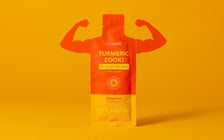Inflammation is the body’s natural immune response to injury and infection, but problems can arise when the inflammatory process goes on for too long and becomes chronic, as chronic inflammation is at the root of most diseases.
Conventional treatment for inflammation usually includes medication, rest, exercise or surgery. The most common over-the-counter medications recommended for short-term acute inflammation are non-steroidal anti-inflammatory drugs (NSAIDs) like aspirin and ibuprofen. However, there are also some changes we can make to our day to day lives that can help reduce inflammation.
What causes inflammation?
Inflammation takes place when a physical factor triggers an immune reaction. Inflammation doesn't necessarily mean there's an infection, but an infection can cause inflammation. The following factors can trigger inflammation:
- Injury or infection
- Excess weight or obesity
- Poor diet
- Sedentary lifestyle
- Smoking
- Stress
- Sleep disorders
- Poor gut health
- Age
- Minor food allergies or intolerances
- Pollution exposure
Chronic inflammation can develop if a person has:
-
Autoimmune disorders: This is when your immune system mistakenly attacks normal healthy tissue, like in psoriasis
-
Sensitivity: Inflammation occurs when your body senses something that shouldn't be there. Hypersensitivity to an external trigger can result in an allergy
-
Exposure: Often long-term, low-level exposure to an irritant, such as an industrial chemical, can result in chronic inflammation
-
Persistent acute inflammation: If you don't fully recover from acute inflammation it can lead to chronic inflammation
How to reduce inflammation
There are a number of natural remedies that can be used instead of medication to prevent and reverse chronic inflammation and really get to the root of the problem.
Anti-inflammatory foods
Diet is one of the most powerful ways to reduce inflammation. Anti-inflammatory foods are high in vitamins, minerals, essential fatty acids, protein and antioxidants, which all help to reduce the damage caused by inflammation. The Mediterranean diet is a great example of a healthy eating plan that contains many anti-inflammatory foods. These include:
-
Vegetables: Beets, carrots, cruciferous vegetables (broccoli, cabbage, cauliflower and kale), dark, leafy greens (kale, spinach), onions, peas, salad greens, sea vegetables and squashes
-
Fruits: Apples, blackberries, blueberries, cherries, nectarines, oranges, pears, grapefruit, pineapple, plums, pomegranates, strawberries and tomatoes
-
Beans and legumes: Adzuki beans, black beans, black-eyed peas, chickpeas and lentils
-
Healthy fats: Avocados, extra virgin olive oil, flaxseeds, almonds and walnuts
-
Fatty fish: Salmon, sardines, mackerel and tuna
-
Herbs and spices: Basil, chilli peppers, cinnamon, curry powder, garlic, ginger, rosemary, turmeric and thyme
-
Protein: Organic eggs, grass-fed meats, healthy cheeses, organic poultry and cultured/raw dairy
-
Quercetin and reservatrol rich foods: Red onion, red wine, cacao, dark chocolate, apples, kale, blueberries, green tea, pistachios, grapes, blueberries and cranberries
Anti-inflammatory supplements
-
Omega 3 fatty acids: Omega 3 fatty acids have been shown to decrease system-wide inflammation, making them helpful to a wide range of health concerns and in particular ones with inflammation at the root, like autoimmune diseases
-
Turmeric: Turmeric contains a powerful component called curcumin, which is known for its ability to inhibit inflammation and to speed up exercise and muscle recovery.
-
Collagen: Collagen is the glue that holds us together and that includes our gut lining. It can help heal any inflammation in and damage to the gut lining, easing symptoms of leaky gut syndrome.
- Probiotics: When the gut microbiota is imbalanced, this can trigger inflammation so balancing the microbiome with live bacteria is key.
Exercise for inflammation
Exercise is vital for optimal health and can actually help lower inflammation. It has been shown that just 20 minutes of moderate exercise can decrease inflammatory responses and protect against chronic conditions with low-grade inflammation. Try to include 150 minutes of exercise per week, and include a variety of exercises such as cardio, muscle strengthening or weight training, walking and yoga in your exercise routine.
Stress and inflammation
Daily practices like yoga, meditation, tai-chi and qigong can help to reduce inflammation and psychological stress. You may not be able to change many of the stressful situations you sometimes encounter in life, but you can work on adapting your response and perception by learning to manage stress better. Getting enough sleep, quitting smoking and limiting how much alcohol you drink are also other ways to help to reduce inflammation in your body.
Avoid inflammatory foods
There are some inflammatory foods and ingredients that can cause inflammation in your body, including:
-
Refined carbohydrates/white flour products
-
Refined sugar and artificial sweeteners like aspartame
-
Trans fats, found in fried foods
-
MSG, a common flavour enhancer
-
Gluten: Not everyone is intolerant or sensitive to gluten, but it can cause inflammation in many people
-
Casein: A protein found in milk
-
Alcohol
Summary
It's key to remember that inflammation is a natural part of your immune response, and in the short term, is actually useful. It's when it becomes chronic that it can be problematic.
Focus on consuming anti-inflammatory foods on a daily basis and eliminate foods from your diet that can trigger inflammation. Consider incorporating anti-inflammatory supplements, reducing your exposure to toxins and pollution and engaging in a variety of relaxation exercises and techniques like meditation. Measures to reduce inflammation pay off over time with improved health and reduced risk of chronic disease.
References




